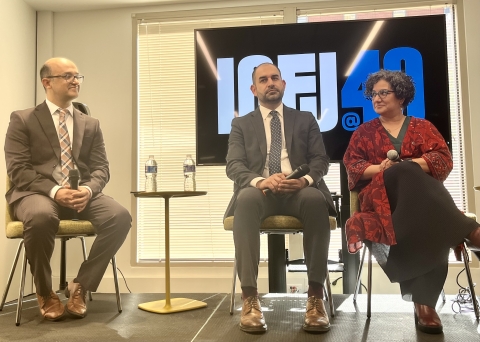This year’s World Press Freedom Day came at a time when free and unobstructed media is in turmoil with the rise of autocratic governments worldwide. In recent years, many journalists have had to flee their home countries and report for their communities from abroad – despite significant risks and hurdles.
“We are giving a voice to voiceless people,” said Sami Mahdi, an exiled Afghan journalist, speaking at a WPFD event on May 2 hosted by ICFJ and Amu TV in Washington, D.C.

Mahdi, an ICFJ Knight Award winner and co-founder of Amu TV, was joined by Khalid Majidyar of the National Endowment for Democracy (NED) and Neda Sanij of Midpoint Press Institute. The panel, on exiled media from Afghanistan and Iran, was moderated by Patrick Butler, ICFJ’s senior vice president of content and community. Also at the event was Damon Wilson, NED’s president and CEO. Free press is a “foundational aspect of democracy,” Wilson said in his opening remarks.
Unique Advantages of Hybrid and Exiled Media
Exiled media face significant challenges, such as lack of funding and threats to their families and reporters on the ground. However, the panelists expressed that, in some ways, exiled journalists have unique advantages.
Mahdi explained that his platform follows a hybrid model in which about half of its staff is in exile, including most of its editors. By placing editors outside the country, there is a level of freedom in editorial judgment that journalists within Afghanistan cannot have. “When you broadcast from abroad, you have the freedom [...] to report on all those atrocities the Taliban are committing,” he said.
Sanij explained that in Iran, a hybrid media model is not an option and that a fully exiled model is the only choice to circulate information both within the country and outside of it. She cites that this fully exiled model is necessary due to the extensive government repression.
Majidyar, the senior manager of MENA programs at NED, also stated that international media organizations, exiled media included, have been able to gain the trust of Iranian citizens over their domestic counterparts. The lack of government influence has generated major support for foreign-based media outlets compared to just 21% trust in the state broadcasting network.
Safety for Exiled Journalists
While exiled journalists may benefit from more editorial freedom, an immense amount of dangers still exist, both for reporters on the ground and editors abroad. A key issue for exiled media organizations is balancing safety while also reporting accurate information.
Mahdi explained that Amu TV protects the identity of its reporters in an effort to keep them safe. Even he does not always know the names of his reporters, and journalists on the ground are not given bylines.
Despite all the measures put in place, Mahdi said that there are still enormous risks. Some of Amu TV’s reporters have been arrested and tortured for their work. “We cannot guarantee [safety] because we are reporting from a country which is led by a hostile group,” said Mahdi, who called on international organizations to offer more support to journalists in Afghanistan.
In the case of Iran, the dangers of the State follow the journalists abroad as well, said Majidyar. He specifically mentioned cases of Iranian journalists in exile facing threats and intimidation even while in exile.
Mobilizing Those Abroad and At Home
Exiled and hybrid media are “functioning as a bridge between the diaspora community and also people inside the country,” said Majidyar. He said that exiled media, and hybrid media specifically, have given those in the diaspora a chance to connect and stay informed, and possibly mobilize for their nation.
“I believe that if it wasn't for the media and the work that we have done, we couldn't get from the Green Movement to the Women, Life, Freedom movement,” said Sanij. She explained that recent efforts to change the government and situation in Iran have been heavily influenced by the work of exiled journalists in recent years.
Exiled media organizations and journalists also are oftentimes supported by members of their community. Mahdi explained that his organization has been financially supported by other Afghans in exile.
And this coverage really matters to those under Taliban rule. Amu TV CEO Lotfullah Najafizada, in his opening remarks, said: “For the people of Afghanistan, young people in particular, free press is their way of life. It is in their DNA.”
Social Media Is Central
Media organizations in exile struggle to connect with their audience because of physical boundaries and government restrictions. Mahdi emphasized the importance of social media as a connection to his audience.
When asked if he worries about the worsening state of independent media in Afghanistan, Mahdi said social media helps circumvent a total ban of free press in the country. Independent media is incredibly important for Afghanistan and is being maintained in exile through social media, he said.
Similarly, Sanij cited social media as a necessary tool for exiled media to communicate with their audience in Iran. It is often the only way for exiled journalists to get on-the-ground information, since the security risks are too great to work with reporters in Iran.
Obtaining information is incredibly difficult for journalists in exile. Beyond the physical distance between reporters and sources, many citizens are hesitant to share information out of fear of arrest. Sanij explained that despite this fear, the people of Iran are brave in their efforts to maintain independent reporting: “We have to go through different channels on social media; use Telegram groups to see what they are talking about, what they are saying. And go to Instagram, which is the main source of information at the moment in Iran.”